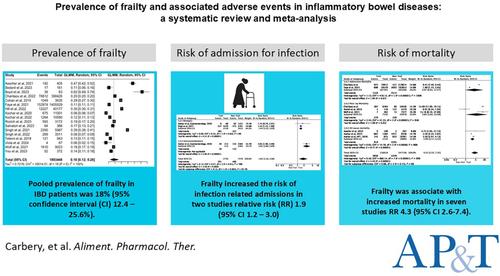当前位置:
X-MOL 学术
›
Aliment. Pharm. Ther.
›
论文详情
Our official English website, www.x-mol.net, welcomes your
feedback! (Note: you will need to create a separate account there.)
Meta‐Analysis: Prevalence of Frailty and Associated Adverse Events in Inflammatory Bowel Diseases
Alimentary Pharmacology & Therapeutics ( IF 6.6 ) Pub Date : 2024-11-11 , DOI: 10.1111/apt.18390 Isabel Carbery, Oliver Todd, Matthew Hale, Christopher J. Black, Andrew Clegg, Christian P. Selinger
Alimentary Pharmacology & Therapeutics ( IF 6.6 ) Pub Date : 2024-11-11 , DOI: 10.1111/apt.18390 Isabel Carbery, Oliver Todd, Matthew Hale, Christopher J. Black, Andrew Clegg, Christian P. Selinger

|
BackgroundThe number of adults aged over 60 years with inflammatory bowel disease (IBD) is increasing. Frailty, rather than chronological age, may be a better predictor of adverse health outcomes.AimsTo summarise current knowledge about frailty in adults with IBD including the prevalence and associations of frailty and IBD‐related adverse outcomes.MethodsWe performed an electronic search of MEDLINE, EMBASE and EMBASE Classic databases using search terms for IBD and frailty from inception to 14 February 2024. All studies involving adults aged ≥ 16 with a confirmed diagnosis of IBD that included a frailty assessment were eligible for inclusion.ResultsWe included 23 observational studies involving 1,893,448 adults. Risk of bias was low for 18 studies and moderate for five. Twelve methods of frailty assessment were used, the most common being the Hospital Frailty Risk Score. Pooled prevalence of frailty in IBD patients was 18% (95% confidence interval (CI) 12.4%–25.6%). Meta‐analysis of unadjusted events data demonstrated that frailty increased the risk of infection‐related admissions following treatment in two studies (relative risk (RR) 1.9; 95% CI 1.2–3.0), post‐operative morbidity in three (RR 2.0; 95% CI 1.4–2.7) and mortality in seven (RR 4.3; 95% CI 2.6–7.4).ConclusionsFrailty is common in patients with IBD and is associated with IBD‐related adverse outcomes including infection‐related admissions following treatment, post‐operative morbidity and death. Future work should focus on developing risk assessment tools to better support decision making for older people with frailty and IBD.
中文翻译:

Meta 分析: 炎症性肠病中虚弱和相关不良事件的患病率
背景60 岁以上患有炎症性肠病 (IBD) 的成年人人数正在增加。虚弱,而不是实际年龄,可能是不良健康结局的更好预测指标。目的总结当前关于 IBD 成人衰弱的知识,包括衰弱的患病率和关联以及 IBD 相关不良结局。方法我们使用 IBD 和虚弱的检索词对 MEDLINE、EMBASE 和 EMBASE Classic 数据库进行了电子检索,检索时间从建库到 2024 年 2 月 14 日。所有涉及 16 ≥ 岁确诊为 IBD 的成年人的研究,包括虚弱评估,均符合纳入标准。结果我们纳入了 23 项观察性研究,涉及 1,893,448 名成年人。18 项研究的偏倚风险较低,5 项研究的偏倚风险为中等。使用了 12 种衰弱评估方法,最常见的是医院衰弱风险评分。IBD 患者虚弱的汇总患病率为 18% (95% 置信区间 (CI) 12.4%–25.6%)。对未校正事件数据的荟萃分析表明,两项研究(相对风险 (RR) 1.9;95% CI 1.2-3.0),三项研究的术后发病率 (RR 2.0;95% CI 1.4-2.7) 和七项研究的死亡率 (RR 4.3;95% CI 2.6-7.4) 增加。结论虚弱在 IBD 患者中很常见,并与 IBD 相关的不良结局相关,包括治疗后感染相关入院、术后发病率和死亡。未来的工作应侧重于开发风险评估工具,以更好地支持患有虚弱和 IBD 的老年人的决策。
更新日期:2024-11-11
中文翻译:

Meta 分析: 炎症性肠病中虚弱和相关不良事件的患病率
背景60 岁以上患有炎症性肠病 (IBD) 的成年人人数正在增加。虚弱,而不是实际年龄,可能是不良健康结局的更好预测指标。目的总结当前关于 IBD 成人衰弱的知识,包括衰弱的患病率和关联以及 IBD 相关不良结局。方法我们使用 IBD 和虚弱的检索词对 MEDLINE、EMBASE 和 EMBASE Classic 数据库进行了电子检索,检索时间从建库到 2024 年 2 月 14 日。所有涉及 16 ≥ 岁确诊为 IBD 的成年人的研究,包括虚弱评估,均符合纳入标准。结果我们纳入了 23 项观察性研究,涉及 1,893,448 名成年人。18 项研究的偏倚风险较低,5 项研究的偏倚风险为中等。使用了 12 种衰弱评估方法,最常见的是医院衰弱风险评分。IBD 患者虚弱的汇总患病率为 18% (95% 置信区间 (CI) 12.4%–25.6%)。对未校正事件数据的荟萃分析表明,两项研究(相对风险 (RR) 1.9;95% CI 1.2-3.0),三项研究的术后发病率 (RR 2.0;95% CI 1.4-2.7) 和七项研究的死亡率 (RR 4.3;95% CI 2.6-7.4) 增加。结论虚弱在 IBD 患者中很常见,并与 IBD 相关的不良结局相关,包括治疗后感染相关入院、术后发病率和死亡。未来的工作应侧重于开发风险评估工具,以更好地支持患有虚弱和 IBD 的老年人的决策。


















































 京公网安备 11010802027423号
京公网安备 11010802027423号